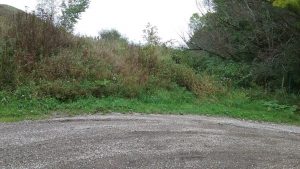Kevin Stuck, Community Development Educator
- Cyberattacks on infrastructure are becoming increasingly frequent, as almost daily national headlines confirm. To assess how prepared local water utilities are to protect their systems against such attacks, Kevin created and mailed a 12-question survey to all 11 water utilities in Sheboygan County. The questions arose out of his extensive research on cyberattacks, municipal water systems, and information technology (IT) best practices for safeguarding networks and computer systems. He then analyzed the results of the seven surveys that were returned and wrote a 1,300-word article that was published in four local newspapers (total circulation 38,000) to raise public awareness of this critical issue. Secondarily, the water utilities were undoubtedly reminded that they need to remain vigilant.
“Thank you for this very interesting and important article. We look forward to publishing it.” – Editor, local newspaper -

Unimproved public access to Lake Michigan in Town of Mosel Local officials seldom have the time or expertise to write grant applications, even though there is often a need for supplementary funding in their communities. Consequently, the Town of Mosel asked Kevin to work with Town officials and staff from the Sheboygan County Transportation Department, County Sheriff’s Department, Christopher Farm and Gardens, Sheboygan Rifle and Pistol Club, and Kohler Co. to prepare a grant application that was awarded $15,232 in matching funds to provide enhancements such as signage, lighting, landscaping, a paved path, and a picnic area to the only public access to Lake Michigan in Mosel. Located at the end of Rowe Road, this underutilized amenity will provide town residents and visitors with a safer, more inviting means to enjoy the lake.
- From January 1, 2021, through July 15, Kevin received over 90 questions from local officials and landowners regarding planning, zoning, and land use issues. Although some of these questions could be answered in a few minutes, many took a couple of hours or more to research and prepare appropriate materials to answer the question accurately and in a way that was understandable. The ultimate objective is always to help with decision making, ensure compliance with regulations and best practices, and further the vision and goals of each community—while at the same time increasing the knowledge of the questioners, thereby helping them to avoid having to ask the same question again in the future.

